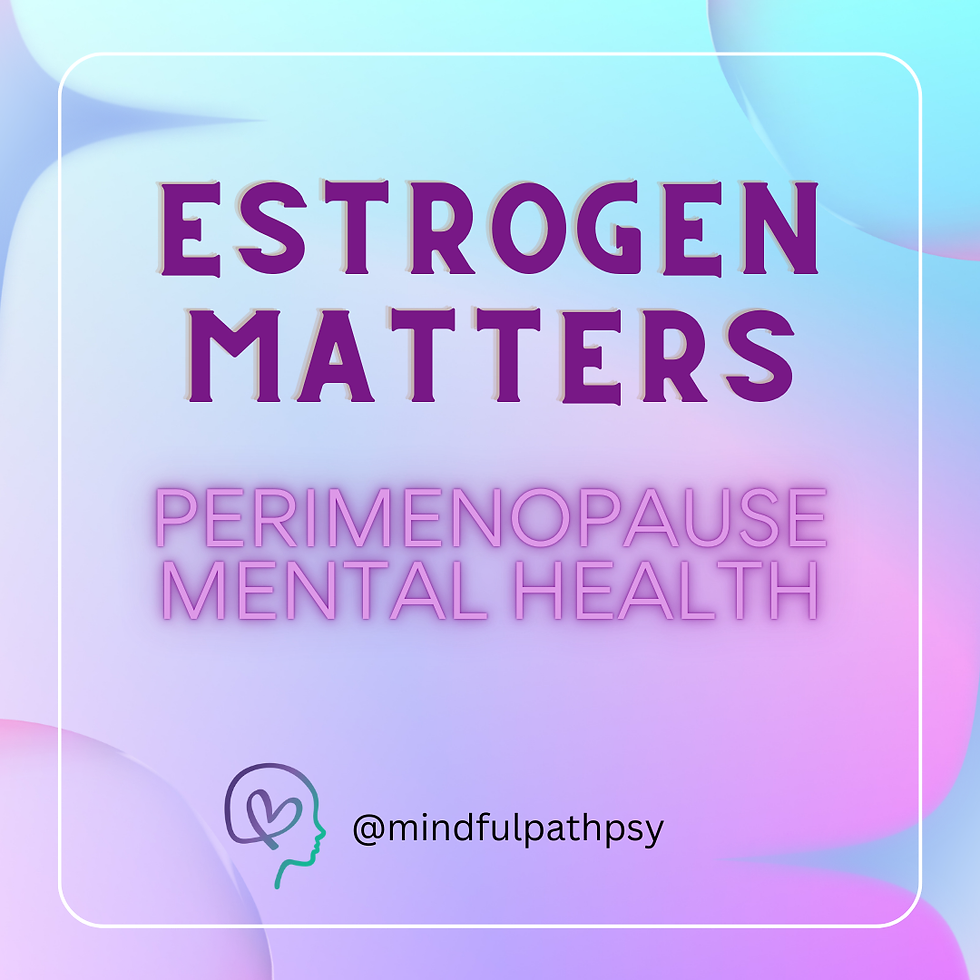Perimenopause Brain Fog: When You Can’t Remember What You Forgot
- drtera

- Sep 25, 2025
- 3 min read
A few days ago, I sat down to write this very blog post, feeling certain I had a brilliant and important idea. I typed a few words, stared at the blinking cursor, and—poof!—the idea was gone. I wracked my brain, came up empty, and decided to move on with my day.
Fast forward to a client session later in the week, where we were discussing her struggles with—you guessed it—brain fog in perimenopause. I giggled internally, thinking: That’s it! That’s what the blog was supposed to be about. No wonder I couldn’t remember!
If you’re laughing (or sighing) with me, you’re not alone. Brain fog is one of the most common and frustrating symptoms of perimenopause. Let’s take a closer look at what’s happening in the brain during this transition, and why you might be misplacing your keys, losing track mid-sentence, or—like me—forgetting your own brilliant blog ideas.

What’s Really Going On With Brain Fog in Perimenopause?
Perimenopause comes with a host of challenges—night sweats, sleep disruption, mood shifts—but brain fog often catches women off guard. Many describe it as:
Trouble concentrating
Forgetting words mid-thought
Difficulty remembering names or tasks
Feeling like their brain is wrapped in cotton
While it can feel alarming (and sometimes even scary), brain fog is not a sign of cognitive decline. It’s the result of hormonal shifts, particularly in estrogen.
The Science Behind the Fog
Neuroscientist Lisa Mosconi, PhD, author of The Menopause Brain, has been a pioneer in explaining what’s happening during this stage of life. She highlights how:
Estrogen plays a direct role in brain function. It helps regulate neurotransmitters, supports energy production in brain cells, and protects neurons from stress.
During perimenopause, fluctuating estrogen creates a ripple effect—leading to changes in memory, focus, and mental clarity.
The brain is not “broken.” Instead, it’s adapting to a new hormonal baseline. Think of it as remodeling rather than deterioration.
These changes are temporary for most women. Once the brain reaches its new equilibrium post-menopause, many women notice their fog lifting.
Mosconi’s research is both validating and hopeful: brain fog has a biological explanation, and you’re not imagining things.
How Perimenopause Informed Psychotherapy Can Help
Even when we know the science, brain fog can feel isolating. Forgetfulness can create anxiety, self-doubt, and frustration, especially for women juggling work, parenting, and caregiving. That’s where support comes in.
As a licensed clinical psychologist with over 20 years of experience, I specialize in women’s health issues—including the mental load of perimenopause. Therapy offers a place to:
Normalize and validate your experience
Develop strategies for managing stress, memory, and focus
Address anxiety or low mood that often accompany brain fog
Reclaim confidence in your daily life
Work With Dr. Tera
✨ Who I AmI’m Dr. Tera, a PhD-level clinical psychologist trained at Utah State University. I’m credentialed via PSYPACT, which means I can provide secure teletherapy in 43 states. Like many of my clients, I’m also navigating perimenopause firsthand—so when I say I understand, I really do.
✨ How I WorkI offer:
Individual therapy
A perimenopause-focused education & process group (currently enrolling!). Hit us up for a complementary prescreen call
Family therapy when hormones ripple into relationships
✨ Access
HIPAA-compliant telehealth sessions
Free 10–15 minute discovery calls to see if we’re a fit
Inclusive care for women across diverse backgrounds, including the LGBTQIA+ community
📩 DM or email me: drtera@mindfulpathpsy.org🌐 www.mindfulpathpsy.org📱 Call/Text: 435-610-1015
References
Mosconi, L. (2024). The Menopause Brain: New Science Empowers Women to Navigate the Pivotal Transition with Knowledge and Confidence. Avery.
💡 Final Thought: If you’ve ever stood in the kitchen wondering why you walked in there, or found yourself mid-story unable to recall the word you needed, you’re not losing your mind—you’re in perimenopause. With support, knowledge, and compassion, you can navigate this transition with clarity and confidence (even when the fog rolls in).



Comments